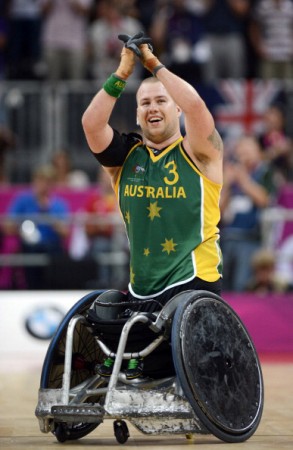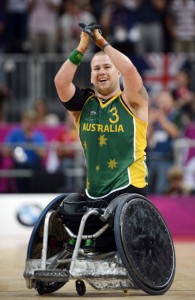By Alison Couldridge
“WHEELCHAIR RUGBY is the glamour sport, and we’re the rock stars,” said GB wheelchair rugby player Myles Pearson soon after entering the Paralympic Village.
His tongue may have been in his cheek, but he was certainly proved right once the tournament started. Thousands of sports fans queued outside the basketball arena at the Olympic Park for hours to ensure they caught Great Britain’s opening game against USA. And many were left disappointed as they were turned away once the arena had quickly filled up; a routine which became familiar as every subsequent game was a sell-out.
There were stories of people sprinting to the turnstiles once the ‘tickets available’ sign flashed up on the screen next to the arena, whether GB were playing or not. As sport information specialist for the Paralympic News Service at the games, I saw first-hand how popular it was and it’s something I want to help continue, which is what this blog is about. The prospect of watching the likes of Australia’s Ryley Batt bulldoze his way through every defence put in front of him to get to the gold medal was clearly one which had to be seen to be believed.
Even Riadh Sallem from tournament minnows France was mobbed while wandering around Olympic Park, even at midnight when he was spied having one celebratory beer for his birthday after proving himself as another one of the sport’s hard men.
It’s been less than two months since the London 2012 closing ceremony and wheelchair rugby players all over the world, medal winners or not, have been riding the wave competing in a Paralympic Games creates.
The Canadian team, who won silver, has had its success recognised by being nominated for the Canadian Sport Awards Team of the Year trophy, bronze medallist Chuck Aoki from team USA was photographed fist-bumping President Barack Obama at the White House and everyone in Batt’s home town of Port Macquarie, New South Wales and beyond wants to hear his story.
Any sport that gains so much momentum so quickly deserves to be built upon. It’s an excellent spectator sport that can literally give people a new lease of life. Just ask GB players Andy Barrow and Ross Morrison, who sustained spinal cord injuries while playing rugby union.
GB’s placing of fifth at the Games was an underachievement for them and as soon as they realised a medal was out of their grasp when they lost their final pool game to Japan, their focus immediately, and rightly, switched to development for Rio 2016. Players competing in their first Paralympics such as Aaron Phipps, Dave Anthony and Steve Brown were given lots of court time and played well to ensure the team maintained their fifth-place world ranking.
Away from the spotlight, a development squad has been meeting regularly and training hard; and work towards the next Paralympics begins in earnest next month as for the first time a GB development team will be taken to an international tournament – Rugbymania in Prague.
The team that coaches Justin Frishberg and Paul Shaw includes players who have been on the fringes for a while, such as Neville Burrell, and new players ready to get themselves noticed including Chris Ryan and Luke White. While Rio is a long way off, they’ll get the chance to make an early impact against the best players in Europe before hopefully progressing to facing tougher opposition from further afield.
The popularity of the sport in this country has been marked by the introduction of three new club teams this season: Caledonian Crushers in Scotland, West Country Hawks in Plymouth and West Coast Crash 2, allowing a second division to be created. This is makes the sport more accessible than ever and, if it continues, the influx of players over the next four years could cause a few headaches for the Rio 2016 selectors, which is no bad thing.
This blog intends to keep you up to date with the world of rugby’s disability equivalent – I’ll report back soon with news on how GB fared in Prague. Wish them luck!
Check out Australia’s road to Gold at London 2012…








